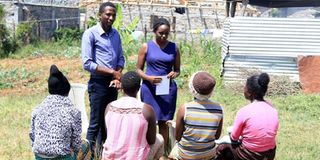Empower social workers to cater for teen parents

Kelvin Ndegwa and his wife Elizabeth Wanjiru talk to teenage mothers at Serene Haven centre in Nyeri on December 27, 2020.
A few weeks ago, a case about a minor who was impregnated by another minor came to a turbulent end. The boy responsible for the pregnancy has been in and out of court for the past three years. The pregnancy happened when he and the girl were both 14.
There are several issues that bear discussion as regards this particular case. The first is that the pregnancy occurred in 2018 and the baby died months later. There has been no mention of counselling for these two, who were clearly too young to be parents, and also too young to be bereaved.
A lot of focus as regards early and teen pregnancies is placed on the interruption to the lives of the parents and caregivers of the young people. Yet the young people themselves suffer life-changing disruption and are rarely, if ever, properly equipped to deal with the ups and downs of such drastic events. The irreversible conversion from student to parent is mostly foisted upon young mothers, who cannot escape the new responsibilities tethered to their bodies by biological design.
Rapists
On the other hand, punishment of adults who impregnate minors should most certainly be implemented far more than it actually is, as too many adult men keep getting away with it.
Additionally, boys and men of any ages who are rapists must go through due process for these heinous and criminal actions.
However, when the father of the pregnancy is a fellow minor, and the context of the sexual encounter or encounters between him and the teen mother can be confirmed to have been consensual, we must really question what the purpose of prosecuting him is.
Criminal justice system
Where a teen boy can be confirmed as the father of a teen pregnancy, what does putting him in the criminal justice system actually serve? What is the point of denying him the opportunity to take on his parental responsibilities, the same responsibilities that are demanded and required of his female teen counterpart?
We must, therefore, ask why teenagers are finding themselves as parents, and we can follow this all the way back to the sexual and reproductive health education that is being actively denied to these young people.
Guilt, shame and fear are not enough to keep teens away from each other, and deliberate systemic ignorance has shown itself to be a very useless method of demanding sexual abstinence from this demographic. Considering our socio-cultural contexts as Kenyans, no 14-year-old is equipped to be a parent without a remarkable amount of support from their community, parents and the government.
Social work should help people cope with everyday problems. It is, indeed, the role of social workers to visit families facing issues such as teen pregnancy and help relief their anxiety, mediate conflicts between them and their families and help them chart a path forward.
These workers can guide young parents into finding a balance between parenting and going back to school. It is thus time for us to start asking questions on how to strengthen their work.





